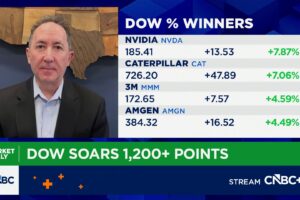
Bloomberg
How Do ECB Chiefs Invest Their Own Cash? Not Very Sustainably
(Bloomberg) — When it comes to investing their own money to tackle climate-change or promote better corporate governance, European Central Bank officials are decidedly average.Members of the ECB’s Governing Council and Supervisory Board keep nearly half of their private investments in assets that rank “average” or “laggard” on a sustainability scale devised by MSCI Inc., according to an analysis by Bloomberg News of publicly available declarations of interest.A quarter of the fund or equity securities owned by the policy makers are considered “leaders” in environmental, social and governance criteria, or ESG. More than a quarter were unrated.The results highlight the challenge of shifting the financial industry toward greater action on climate change and other goals such as corporate gender balance or labor rights, even by committed professionals. The process of divesting from companies that harm the environment or assessing compliance with social targets is messy and takes time — as evidenced by Bill Gates’ long exit from fossil fuels.ECB President Christine Lagarde has voiced support for the European Union’s efforts to transition to a more climate-friendly economy and has promoted gender parity in the workplace since taking over leadership of the institution in 2019.“The shift to net-zero emissions, together with an adequate digital backbone, will require major investments across Europe in technology, infrastructure and networks,” Lagarde said on May 6, while calling for more regulatory action to support sustainable finance.An ECB spokesman declined to comment on the officials’ portfolios.Ratings that assess resilience to environmental, social or governance risks can offer indications on sustainability for investors, but they are also relatively new and suffer from a lack of comparable data. Lagarde and other officials have said that the difficulty of measuring climate and other risks impedes the use of such ratings to measure change in the industry.Own PortfolioWhile the ECB is still debating to what extent it can justifiably integrate climate goals into its monetary policy, officials have pledged to increase exposure to green investments in the “own funds” portfolio it uses to generate income for operating expenses.When it comes to officials’ private investments, the disclosures reveal few securities that directly tackle the range of concerns embodied in ESG ratings. MSCI’s metrics measure the resilience of companies and funds to long-term, industry-specific ESG risks, with ratings ranging from leader (AAA, AA), average (A, BBB, BB) to laggard (B, CCC).For instance, Executive Board member Isabel Schnabel holds 11 assets that fall into MSCI’s ESG “leader” category — including shares in Microsoft Corp. and SAP SE — and 27 that are rated average.Schnabel has one of the most extensive portfolios of all the Governing Council members, and has talked about the need to diversify investments. In a podcast released on May 12, she also said her thinking about how central banks should deal with with the environmental threat has changed.“Once one appreciates how important the financial sector is for this green transition, one has to admit that we as central bankers have to think about our role in the fight against climate change,” she said.For more articles like this, please visit us at bloomberg.comSubscribe now to stay ahead with the most trusted business news source.©2021 Bloomberg L.P.










